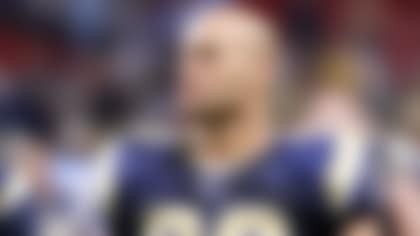NEW YORK -- One week after they drew heavy fines for illegal hits, James Harrison and Brandon Meriweather were praised by the NFL for clean play in Sunday's victories.
Ray Anderson, the league's executive vice president of football operations, told The Associated Press on Monday that Meriweather and Harrison "heeded our emphasis" on eliminating fouls and deserve to be lauded. So do others, Anderson said, after no flags were thrown for illegal hits to defenseless players in the 13 games.
Harrison was fined $75,000 and Meriweather $50,000 for hits to defenseless opponents last week, when the NFL announced it would begin suspending players for such tackles.
"We like to think we're off to a good start in terms of the new emphasis and the recognition that we are going to play aggressively but well within the rules," Anderson said. "It's a good start."
"Brandon Meriweather, specifically, last week we were appropriately calling him out and chastising him," Anderson added. "Yesterday in the Patriots' game at San Diego, Meriweather made two very tenacious, effective and legal hits in similar situations. But you could see it, he lowered the target area, blasted the opponent with his shoulder. He adapted, showing it can be done. It is appropriate to praise him for the tough play."
Patriots coach Bill Belichick was surprised to hear about Anderson's praise.
"I think that would be a first for me," Belichick said Monday. "The officials are now evaluating the players and their performance. No, I mean that's great."
Belichick then paused several seconds before adding: "I can't tell you how much that means to me, really," drawing laughter from a room full of reporters.
Anderson also mentioned Harrison, who skipped one day of practice last week and said he contemplated retirement rather than change how he plays. But Harrison played cleanly in a win at Miami, particularly on a play in which Dolphins running back Ronnie Brown already was being hit by Steelers linebacker Larry Foote.
"There certainly was one play, on a hit on a running back, that James Harrison may have taken a shot at the running back going down, and Harrison let up," Anderson said. "I think he acknowledged he let up when had a chance to put his head and helmet in there. I applaud James for restraining himself."
Harrison recalled the play and how he pulled up near Brown when he realized it would be a high hit.
"Other than one play, I was fine," Harrison said. "I wasn't trying to send a message (by playing cleanly). There was no extra motivation for this or any other game. I was just out there playing the game the way that I've been taught to play it since I was 10 years old."
Harrison still seemed to believe the crackdown stemmed from the press coverage of the previous weekend's flagrant tackles.
"Maybe if that was the only one that happened," Harrison said of his hit on Cleveland Browns wide receiver Mohamed Massaquoi that drew the hefty fine, "it wouldn't have transpired the way it did. But there were three or four other hits. It caused a real media storm, and I guess they felt they had to do something and they got everybody."
This week, they probably won't get anyone, judging by Anderson's comments.
One hit that was questioned came in the Tennessee Titans' victory over the Philadelphia Eagles. Titans running back Chris Johnson was headed down the right sideline when he was slammed helmet-to-helmet by Eagles linebacker Ernie Sims. No flag was thrown -- correctly.
Anderson explained that Johnson was a runner with the ball heading downfield and was anything but a defenseless player. Sims' hit was well within the rules.
"It's never been an intention to legislate all helmet-to-helmet hits out of the game," said Anderson, a member of the NFL's competition committee and one of the league's loudest voices about player safety. "We just are trying to make sure when a player is in a defenseless situation, he is not hit in the head or neck area."
Copyright 2010 by The Associated Press



